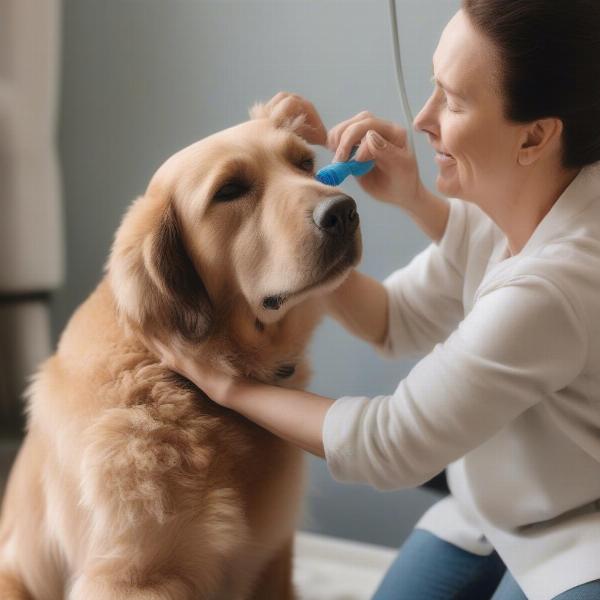Swollen ears in dogs can be alarming for any owner. This common issue can stem from various causes, ranging from minor irritations to serious infections. Understanding why your dog’s ears are swollen is the first step towards providing appropriate care and relief. This article will delve into the potential reasons behind swollen dog ears, outlining symptoms, diagnosis, treatment options, and preventive measures.
Common Causes of Swollen Ears in Dogs
Several factors can contribute to ear swelling in dogs. Some of the most frequent culprits include:
- Ear Infections: Bacterial and yeast infections are leading causes of swollen ears. These infections thrive in warm, moist environments like a dog’s ear canal. Symptoms often include redness, discharge, odor, and head shaking.
- Allergies: Just like humans, dogs can suffer from allergies. Environmental allergens like pollen, dust mites, and mold, as well as food allergies, can trigger inflammation and swelling in the ears.
- Ear Mites: These tiny parasites are highly contagious and cause intense itching and irritation. A dark, waxy discharge resembling coffee grounds is a telltale sign of ear mites.
- Foreign Bodies: Grass seeds, foxtails, or even small insects can become lodged in a dog’s ear canal, leading to irritation, inflammation, and subsequent swelling.
- Trauma: Injuries to the ear, such as bites, scratches, or hematomas (blood-filled pockets), can cause significant swelling.
- Aural Hematomas: These are blood-filled swellings that develop between the cartilage and skin of the ear flap. They are often caused by excessive head shaking or scratching due to underlying ear problems.
Recognizing the Symptoms
Recognizing the signs of swollen ears is crucial for early intervention. Besides the obvious swelling, look out for these symptoms:
- Redness and inflammation
- Discharge (yellow, brown, or black)
- Unpleasant odor
- Excessive scratching or pawing at the ears
- Head shaking or tilting
- Whining or yelping when the ears are touched
- Loss of balance or disorientation (in severe cases)
Diagnosing the Problem
If you suspect your dog’s ears are swollen, a visit to the veterinarian is essential. The vet will conduct a thorough examination, which may include:
- Visual inspection of the ear canal
- Otoscopic examination to view the eardrum and inner ear
- Cytology to examine ear discharge for bacteria, yeast, or mites
- Allergy testing (if allergies are suspected)
Treatment Options for Swollen Dog Ears
Treatment for swollen ears depends on the underlying cause. Your veterinarian may recommend:
- Ear Cleaners: Medicated ear cleaners can help remove debris and excess wax, creating a less hospitable environment for infections.
- Ear Drops: Antibiotic or antifungal ear drops are commonly prescribed for ear infections.
- Oral Medications: In some cases, oral antibiotics or anti-inflammatory medications may be necessary.
- Parasite Treatment: If ear mites are present, your vet will prescribe a specific miticide.
- Surgical Intervention: For aural hematomas or foreign body removal, surgery may be required.
Preventing Swollen Ears
While not all causes of swollen ears are preventable, some measures can help reduce the risk:
- Regular ear cleaning: Cleaning your dog’s ears regularly with a veterinarian-approved ear cleaner can help prevent the buildup of wax and debris.
- Allergy management: If your dog has allergies, work with your vet to identify and manage the triggers.
- Parasite prevention: Use regular flea and tick preventatives, as these can also help prevent ear mites.
- Careful grooming: Trim the hair around your dog’s ears to improve air circulation and reduce moisture.
When to Seek Veterinary Care
It’s crucial to seek veterinary attention if:
- The swelling is severe or accompanied by other symptoms like pain or discharge.
- Your dog is exhibiting signs of discomfort, such as head shaking or scratching.
- The swelling doesn’t improve within a few days of home care.
- You suspect a foreign body is lodged in the ear canal.
 Cleaning a dog's ears at home
Cleaning a dog's ears at home
Conclusion
Swollen ears in dogs can be a sign of various underlying issues. By understanding the potential causes, symptoms, and treatment options, you can help your furry friend get the care they need. Regular veterinary checkups and preventative care are crucial for maintaining your dog’s ear health and overall well-being. Remember, never attempt to treat your dog’s swollen ears without consulting a veterinarian, as improper treatment can worsen the condition.
FAQ
- How can I tell if my dog’s ears are infected? Signs of infection include redness, swelling, discharge, odor, and excessive scratching.
- Can I use human ear drops on my dog? No, never use human ear drops on your dog. They can be harmful and may not be effective.
- How often should I clean my dog’s ears? Consult your veterinarian for guidance, as the frequency depends on your dog’s breed and individual needs.
- Are all ear infections in dogs painful? Most ear infections cause some level of discomfort, ranging from mild itching to severe pain.
- Can allergies cause swollen ears in dogs? Yes, allergies can trigger inflammation and swelling in the ears.
- What should I do if I find a foreign object in my dog’s ear? Do not attempt to remove it yourself. Contact your veterinarian immediately.
- Can swollen ears in dogs lead to hearing loss? In severe or chronic cases, untreated ear infections can potentially lead to hearing loss.
ILM Dog is your trusted resource for all things dog-related. We offer expert advice on dog breeds, health and medical care, training, nutrition, grooming, and much more. If your dog is experiencing swollen ears or any other health concerns, don’t hesitate to reach out to our team of experts. Contact us at [email protected] or call us at +44 20-3965-8624. ILM Dog is dedicated to providing comprehensive and reliable information to help you provide the best possible care for your canine companion.